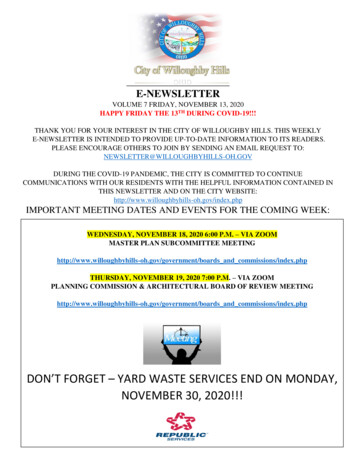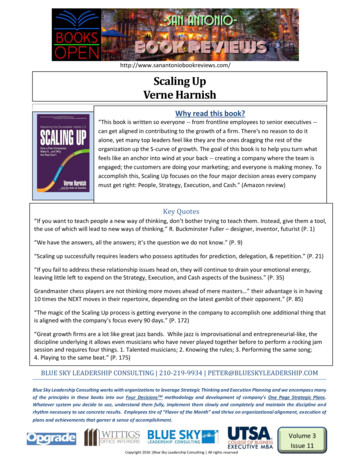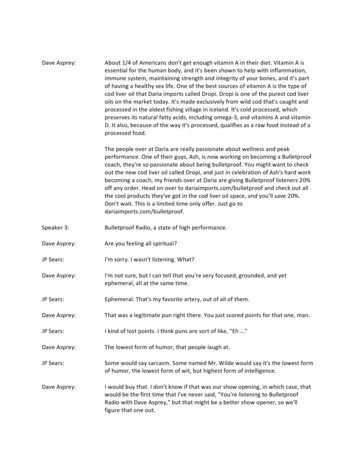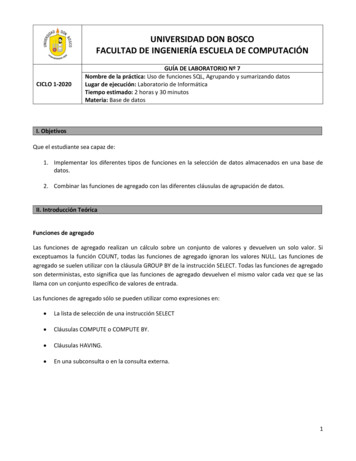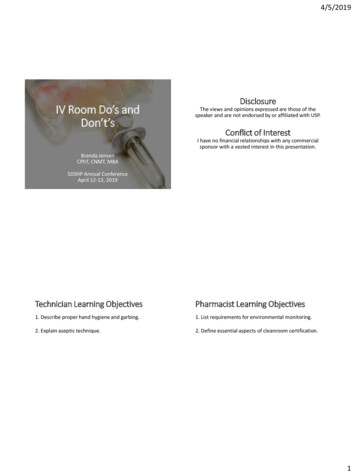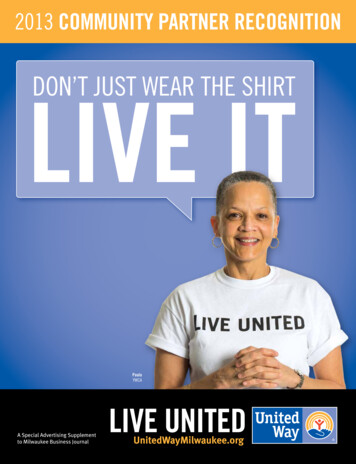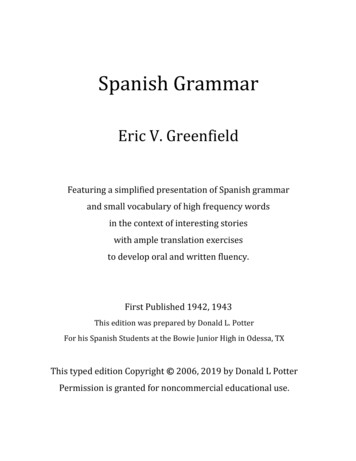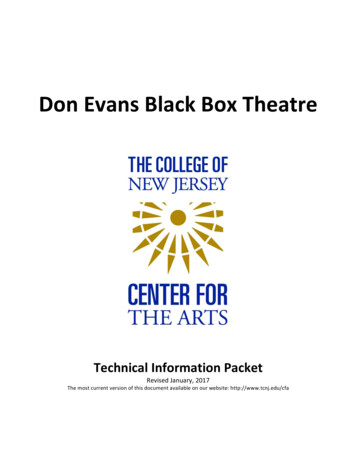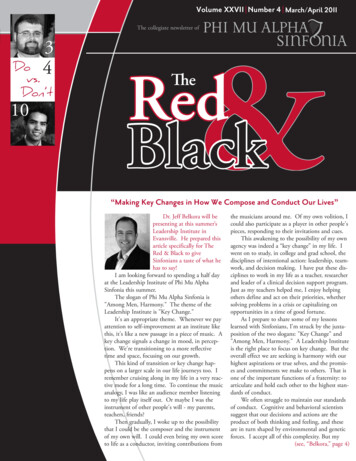
Transcription
Volume XXVII Number 4 March/April 2011The collegiate newsletter of3Do 4vs.Don’t10“Making Key Changes in How We Compose and Conduct Our Lives”Dr. Jeff Belkora will bepresenting at this summer’sLeadership Institute inEvansville. He prepared thisarticle specifically for TheRed & Black to giveSinfonians a taste of what hehas to say!I am looking forward to spending a half dayat the Leadership Institute of Phi Mu AlphaSinfonia this summer.The slogan of Phi Mu Alpha Sinfonia is"Among Men, Harmony." The theme of theLeadership Institute is "Key Change."It's an appropriate theme. Whenever we payattention to self-improvement at an institute likethis, it's like a new passage in a piece of music. Akey change signals a change in mood, in perception. We're transitioning to a more reflectivetime and space, focusing on our growth.This kind of transition or key change happens on a larger scale in our life journeys too. Iremember cruising along in my life in a very reactive mode for a long time. To continue the musicanalogy, I was like an audience member listeningto my life play itself out. Or maybe I was theinstrument of other people's will - my parents,teachers, friends?Then gradually, I woke up to the possibilitythat I could be the composer and the instrumentof my own will. I could even bring my own scoreto life as a conductor, inviting contributions fromthe musicians around me. Of my own volition, Icould also participate as a player in other people'spieces, responding to their invitations and cues.This awakening to the possibility of my ownagency was indeed a “key change” in my life. Iwent on to study, in college and grad school, thedisciplines of intentional action: leadership, teamwork, and decision making. I have put these disciplines to work in my life as a teacher, researcherand leader of a clinical decision support program.Just as my teachers helped me, I enjoy helpingothers define and act on their priorities, whethersolving problems in a crisis or capitalizing onopportunities in a time of good fortune.As I prepare to share some of my lessonslearned with Sinfonians, I'm struck by the juxtaposition of the two slogans: "Key Change" and"Among Men, Harmony." A Leadership Instituteis the right place to focus on key change. But theoverall effect we are seeking is harmony with ourhighest aspirations or true selves, and the promises and commitments we make to others. That isone of the important functions of a fraternity: toarticulate and hold each other to the highest standards of conduct.We often struggle to maintain our standardsof conduct. Cognitive and behavioral scientistssuggest that our decisions and actions are theproduct of both thinking and feeling, and theseare in turn shaped by environmental and geneticforces. I accept all of this complexity. But my(see, “Belkora,” page 4)
Operational UpdatesChapters:Colonies:23216Omicron Theta (New Jersey City University)Iota Eta (Central State University)Pi Kappa (Langston University)Florida Eta (Florida Atlantic University)Zeta Pi (Loyola University)Eta Iota (University of Louisiana-Monroe)Epsilon Pi (Hartwick College)Iota Tau (Old Dominion University)Iota Beta (North Carolina A&T State Univ.)Beta Psi (University of California-Los Angeles)Eta Phi (University of Southern Mississippi)Pi Nu (Jackson State University)Delaware Beta (Delaware State University)Xi Beta (Benedict College)Nu Theta (Kennesaw State University)Omicron Delta (Alabama A & M University)Alumni Associations:17Collegiate members in Good Standing5,161Collegiate members on Suspension561Collegiate members (total)5,722Percentage of total collegiate suspensions 9.80%Total amount of outstandingper capita tax owed to Sinfonia 69,492.00Publication InformationThe Red & Black is published as an informationalnewsletter for the Fraternity’s chapters, colonies, facultyadvisors, governors, committeemen, and national officers.The Red & Black is printed bimonthly, September toApril. Articles from your chapter are highly encouraged forupcoming issues. Please send the articles and photographsto editor@sinfonia.org. The deadline for theSeptember/October issue is August 5, 2011.Editor/Layout: Jeremy M. Evans, Delta Nu ’98Lyrecrest Staff:Chief OperatingOfficerJeremy M. Evansevans@sinfonia.orgExt. 108Director of Collegiate William C. Lambert, Iota Alpha ’05Programs & Education lambert@sinfonia.orgExt. 102Retreat Coordinator Drew B. Lewis, Theta Tau ’08& Programs Associate lewis@sinfonia.orgExt. 103AdministrativeAssistantKimberly J. Dailydaily@sinfonia.orgExt. 100ControllerTonya R. McGuiremcguire@sinfonia.orgExt. 105Jon W. Raderrader@sinfonia.orgExt. 106Shipping ClerkDid You Know?Want to see the National Archives? Many of theresources and items available for viewing in the archiveshave been scanned and are available to be viewed at ourwebsite: www.sinfonia.org/historyPage 2From the NationalCollegiate Representative“It's spring fever. That is what the name of it is. Andwhen you've got it, you want–oh, you don't quite knowwhat it is you do want, but it just fairly makes your heartache, you want it so!” Mark TwainWinter is finallymelting away, andspring is upon us! Wecan hem and haw inour daily lives about struggling to reinventourselves, renew ourselves, and rejuvenateourselves; but to watch all of nature start thatprocess is awe-inspiring indeed.Imagine yourself for a moment as thefirst to recognize the cycle of the seasons. Weoften speak about the cyclical nature of theUniverse, but can you even imagine being thefirst to look around and not only recognizethe return of growth, but to come up withthe theory that life in fact has an ebb andflow to it? As society created its own culturalmemory, it has only become too obvious thatthe seasons must progress on. What mostinterests me about this notion though are thethings we could still be missing. What are wefailing to recognize around us that only laterwill become obvious? More importantly forus today, what things in our own lives are wefailing to recognize that we will only come toterms with when it’s much too late?These are questions I can’t answer, but Ihope that you can find your own answers inyour own journey. It can be intensely difficult within our own lives to recognize opportunities and how they fit into our big picture.One recommendation I can make is to bevigilant in your search for answers–if you’renot paying attention they could easily passyou by. The other is something taught to usby spring, and is also found buried in a quotewe have all grown to love.Spring doesn't happen overnight. Wehave months of strange weather–cold temperatures and warm breezes, or vice versa.Spring cannot be forced; it must take itssweet time in coming to fruition. Likewise,we shouldn’t force change in our own livesovernight. In a writing by Horatio Dresser(which Ossian later quoted) from 1896, hestates, “Not all at once can the soul master itsobjective passions, and be truly ethical in itsouter life. True wisdom consists in carefuladjustment of means to ends, in slow, patient,persistent overcoming in close imitation ofnatural evolution, not in assuming that thevictory is already won.” The later part thatwe all know so well, I’d like you to read now,emphasizing a new word in it.“This it is to be a man: to be and notseem, to do and not simply to talk, to havethe right ideal, the true motive, and patientlyto transform conduct in accordance with it.”It’s an easily overlooked word, but it may beof highest importance in the whole idea. Bepatient when transforming and improvingyourself, and it will lead to greater success.This summer at our Leadership Institute,you will have great opportunities to be amongother brothers all working to improve themselves. I highly encourage your attendance,and there is no doubt in my mind that allpresent will learn great new tools to patientlytransform their conduct for the betterment oftheir chapters, and for all of Sinfonia.Until next we meet, I amFraternally Yours,In Phi, Mu, and Alpha,Benjamin “Twitchy” Strack, Delta Iota(Western Michigan) ’05National Collegiate Representative
From the Retreat Coordinator and Programs Associate“The Making of Men”by Drew Lewis, Theta Tau (Austin Peay) ’08Since I began working as RetreatCoordinator and Programs Associate, I havespent considerable time pondering the purposeof our brotherhood and what we can do to further advance our order. In doing so, I havebeen intrigued by the multifaceted nature offraternal purposes and the complexity ofSinfonia’s mission. While Brothers immediately recognize the significance of our object, Ifind a greater subtlety is required to grasp Father Mills’ declarationthat “our business is the making of men.” Upon initial review ofour Object, such a directive of making men appears out of syncwith what we understand to be our goals as supporters of music.However, before any can strive to achieve an ideal, they must firstevolve into a being capable of the rough, precipitous road of thehighest type of man. Thus, I would submit to you that makingmen is not only of critical import to Sinfonia’s mission, it is centralto our Brotherhood.One may ask how Sinfonia affects this change in young men.Put simply; accountability. The manly musician is accountableboth in his art and in his life, not only materialistically, but also idealistically. When we say that Phi Mu Alpha expects each man to doa brother’s part, we speak not only of the first of these concerns butalso the second. In the material realm, dues are simply another billto be paid; chapter and initiation reports just more homework. Inthe sense of ideals, however, the paying of dues is a manifestation ofyour energy for the advancement of Sinfonia; the paperwork being asymbol of your commitment to uphold all that is true, beautifuland abiding.One of my personal favorite activities to do with chapters onretreat is to read the writings of Percy Jewett Burrell. In his 1909address, Brother Burrell speaks to the idea of living high ideals, stating: “The Sinfonia will grow, my brothers, as you grow because theSinfonia is you. The word is of eight letters. The spirit is of youwhich can never be spelled out except in life itself. The mutual welfare and brotherhood of musical students will decline and die if youare selfish, careless and indifferent. Sinfonia will become not something, but somebody, as you grow in a living, loving force in thegreat big world.” The musician must perform his art with theutmost attention to detail. That same level of dedication is whatSinfonia asks of our every interaction with the world.As Sinfonians, we strive to uphold the beauty and power ofmusic in the world. Such an ambitious declaration can only be metby men with strong ideals and a high level of maturity. As we continue in what Brother Burrell called our apprenticeship in Sinfonia,we fulfill Father Mills’ directive by working for the betterment ofmankind and ourselves. Though we come from all walks of life,every one of us had an elder brother that showed us what it meantto be a man and not a just boy of legal age. This is the true meaning of brotherhood; the means of turning young boys into men ofquality and, in Sinfonia’s case, advocates of the highest ideals inmusic.As always, Brothers, so let it be for Sinfonia!Work Weekend – May 20-22, 2011Would you like to contribute to the Fraternity at a nationallevel, view the National Archives and meet brothers from across thecountry? If so, Work Weekend is for you! Providing an opportunityfor fellowship, singing and brotherhood Work Weekend also servesas a great opportunity to meet with brothers from all parts of thecountry.For over two decades, hundreds of brothers have come togetherat Lyrecrest to participate. Work Weekend is a very necessary partof maintaining the aesthetic value of your National Headquarters.What does it cost? Nothing! There is no registration fee. All youhave to do is get to Lyrecrest! Lodging and meals are free!Register online today at www.sinfonia.org/workweekendPage 3
(from, “Belkora,” page 1)diagnosis is that many of the problems we face as a society arecaused by a tendency toward under-thinking. My orientation is toshore up our capacities for thoughtful action as a means of elevatingourselves.So I look forward to sharing with Sinfonians some very practical techniques for thinking, talking, and writing more effectivelyabout the decisions, dilemmas, and opportunities we will all face inour lives. My approach will be to offer a dozen or so specific checklists or frameworks to use. We'll talk about and practice SCOPingdecisions; making personal strategic plans; harnessing five keysources of wisdom; following three rules for living; maintaining perspective; and many other proven approaches to reflecting criticallyand acting decisively. Sinfonians will take home specific tools (suchas templates) that will provide a competitive advantage in leadership, teamwork, and decision making.I'll also share my lifelong journey in writing songs. The message I hope to convey is the following:Let us be artistic and intentional about how we compose andconduct our lives, making key changes when necessary, so that wemay live in harmony with our highest goals and aspirations.Leadership Institute 2011Key ChangeDon’t miss your chance to meet and learn from Dr. Belkoraand all of the other great presenters at Leadership Institute 2011!Visit www.sinfonia.org/institute and get registered today!The Dos and Don’ts of Chapter By-Lawsby Jesse Reyes, Omicron Pi (Cal State-Fullerton)’05, Chairman, CPRs’ CouncilDuring my conversations with many brothersacross the nation, I have noticed that many chapters implement chapter bylaws in a different way.I think there are some ways that chapters canimprove on their bylaws and hopefully they canbecome something that is useful, rather thansomething that people forget even exist. Chapterbylaws can set an efficient way of doing business within the chaptermeeting and they can be used to set the roles and responsibilities ofe
04.03.2011 · The slogan of Phi Mu Alpha Sinfonia is "Among Men, Harmony." The theme of the Leadership Institute is "Key Change." It's an appropriate theme. Whenever we pay attention to self-improvement at an institute like this, it's like a new passage in a piece of music. A key change signals a change in mood, in percep-tion. We're transitioning to a more reflective time and space, focusing on

